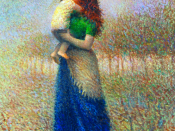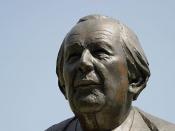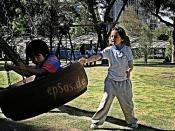The Play Years Early childhood is often characterized by endless make-believe and sociodramatic play which indicates the development of mental representation. Sociodramtic play differs from simple make-believe play in that it involves play with peers. This stage of play is often referred to as the Preoperational Stage. This is the stage immediately after Piaget's Sensorimotor Stage. The Preoperational Stage spans from two to about five or six years of age. At this stage, according to Piaget, children acquire skills in the area of mental imagery, and especially language. They are very self-oriented, and have an egocentric view; that is, preoperational children can use these representational skills only to view the world from their own perspective (http://web.psych.ualberta.ca/~mike/Pearl_Street/Dictionary/contents/P/piaget's_stages.html).
Throughout early childhood, children's preoperational cognitive development is observed. Egocentrism -- being unaware of any perspectives other then their own -- is often seen is children ranging from two to six or seven years.
Piaget's three mountain problem illustrates this phenomenon clearly; that is, children who looked at three mountain peaks, designated by different colors, could not pick a picture representing the three peaks from a doll's point of view. Instead, the pictures represented their own point of view.
Conservation problems also are characteristic of early childhood. Conservation refers the changing of an object's outward appearance while its physical make-up stays the same. For example: Joe and Judy both receive a box of raisins each. Joe eats his from the box while Judy spreads hers out onto the table. Joe seeing that Judy's raisins appear to take up more space, declares that "Judy got more than I did." Although the skill of reasoning makes improvements during childhood, often times, children link two unrelated events together in a cause-and-effect fashion. This reasoning is called transductive reasoning and results from the lack of reversibility, or...


